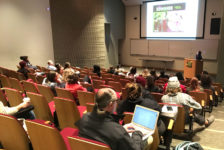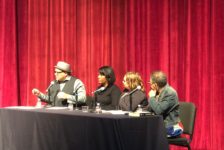
Chase Ross, a graduate student at Concordia University, is set to speak at the Bastian Lecture Series on Oct. 22. Ross studies topics and issues in the transgender community as well as publishes successful YouTube videos on the topic. Photos courtesy Chase Ross
The upcoming Bastian Lecture Keynote, “The Complexity of Passing: Maintaining Identity as a Trans Person,” will discuss diversity in academia with research and real-life experiences in the transgender community on Oct. 22.
Chase Ross, a graduate student researching the experiences of transgender identity, will be the first speaker in the Bastian Diversity Lecture Series on campus. In his keynote, Ross will explore the experiences of transgender masculine individuals, identity and Internet culture.
Ross started talking publicly about transgender topics in 2006. His YouTube video, “Shit Trans Guys Say” has received almost 400,000 views. The unexpected popularity of the comedic yet truthful video made Ross realize the impact he had on people. He explained that, at that time, he noticed people were watching and stopped talking about his own life and instead turned to “real issues.”
Ross said he hopes to take this opportunity “to normalize trans lives.”
Ross, who has a master’s degree in sociology from Concordia University in Canada, started research on the transgender community during his bachelor’s degree studies. He creates YouTube videos on these topics three times a week and has a prominent Tumblr presence.
“YouTube has become a safe haven,” Ross said. “Maybe that’s what’s going to start happening—not just people ranting to their cameras but bringing into real life and talking about real issues and solving issues.”
Along with Ross, many activists on the Westminster campus answer the same questions. Having an understanding of what transgender equality means and can be especially important on campus and in the digital age.
“Chase represents an identity as a trans individual that has received little to no attention or acknowledgement in higher education to the extent we’re seeing it now,” said Tamara Stevenson, faculty fellow of diversity and inclusion.
Following up with this statement, Ross said “putting a face to ‘this is a trans person that has a life’” is an important aspect to his research and videos.
“We’re not trying to change how school functions… but to shed light,” he said.

A mix of comedic and serious videos, Chase Ross first took to YouTube to document his transition and now focuses on addressing issues and topics in the transgender community. His most popular video, “Shit Trans Guys Say,” can be found on his channel: uppercaseCHASE1.
In regards to the upcoming lecture, Ross said he is really excited to talk about issues that are relevant today and to bring his research into it
Stevenson, a part of Westminster’s Diversity and Inclusion on campus, said she looks forward to what Ross has to bring to the community.
“I’m just excited to meet him and talk about his scholarship as well as his life experiences,” Stevenson said. “I always encourage our speakers to bring their best effort to shake things up, make us think, make us wonder, inquire and reflect.”
Although Westminster has made progress and effort to expand its inclusion of every member of the community, there is still room for improvement.
“There’s always more that can be done,” Stevenson said. “There’s more in quantity, I would like to see the quality increase.” She went on to explain the importance in “recognizing where our privileges are and acknowledging those privileges.”
“When we know better, we can do better,” Stevenson said. “We all have a part in contributing to positive, healthy inclusion.”









